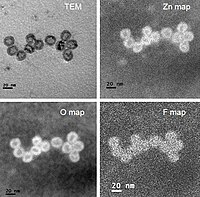
Photo from wikipedia
In this study, maltose-functionalized magnetic core/shell nanoparticles (Fe3O4@Au NPs) as a promising carrier matrix for a simple and effective immobilization of L-asparaginase (L-ASNase) were prepared and characterized using imaging techniques… Click to show full abstract
In this study, maltose-functionalized magnetic core/shell nanoparticles (Fe3O4@Au NPs) as a promising carrier matrix for a simple and effective immobilization of L-asparaginase (L-ASNase) were prepared and characterized using imaging techniques including atomic force microscopy (AFM) and transmission electron microscopy (TEM), and vibrating sample magnetometry (VSM). The results indicate that the NPs are monodispersed with an average diameter of 10 nm and magnetization of 9.0 emu g-1. Under the optimal conditions, 77.2 ± 2.3% of the total L-ASNase was immobilized. It was found that the acid-base tolerance and thermal stability of immobilized L-ASNase were significantly improved in comparison to the free form of the enzyme in solution. For instance, while only 10% of the immobilized enzyme was lost its activity, the free form was lost its activity more than 50% after 3 h incubation at 55 oC. After 13 times recycling, the immobilized L-ASNase retained about 50% of its initial activity. Moreover, the free and immobilized L-ASNase maintained their initial activities about 25 and 64% after 28 days storage at 25 °C, respectively. Km value of immobilized L-ASNase decreased to 1.59 from 2.95 mM as an indication of increased enzyme affinity for the substrate. The results of this study suggest that the maltose-coated magnetic nanoparticles are excellent nanovehicles to carry enzymes for a range of industrial applications.
Journal Title: International journal of biological macromolecules
Year Published: 2019
Link to full text (if available)
Share on Social Media: Sign Up to like & get
recommendations!